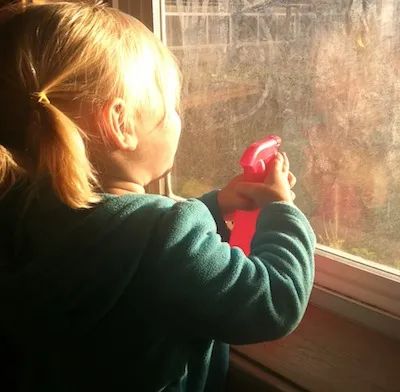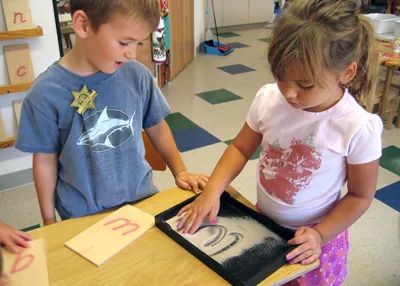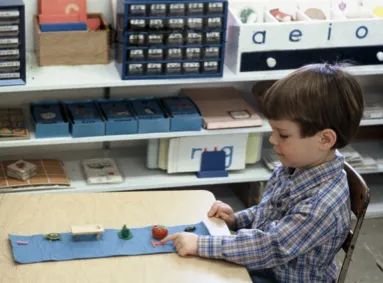The Ten Secrets of Montessori - #5 Individual Differences
"When the independent life of the child is not recognized with its own characteristics and its own ends, when the adult man interprets these characteristics and ends, which are different from his, as being errors in the child which he must make speed to correct, there arises between the strong and the weak a struggle which is fatal to mankind." - Maria Montessori
Maria Montessori uncovered secrets--ten to be exact. Lucky for us, Mary Ellen Maunz, M. Ed., founder and Program Director of Age of Montessori, is willing to share the treasure of information within these secrets, and to explain exactly what they can mean to you and your children. With these ten secrets, you will gain a rich understanding of the framework beneath the Montessori Method. Maria Montessori developed more than a revolutionary educational method; she discovered the true inner workings of the child’s mind. These ten secrets are based on her lifetime of observing children and recognizing what they really need to thrive.

Secret #5: Individual Differences
Each individual child has different interests, different strengths, and different developmental needs.

Anyone who has spent any time with children can tell you this: children are all different. Each individual child has different interests, different strengths, and different developmental needs. Given these differences, does it make sense to teach all children the same lesson at the same time? Not really, yet this is exactly what traditional schools have been doing for ages. This educational model is even less sensible when you consider that there has been a solution to this problem for more than a century. It’s called the Montessori Method.
…to give the whole of modern culture has become an impossibility and so a need arises for a special method, whereby all factors of culture may be introduced to the six-year-old; not in a syllabus to be imposed on him, or with exactitude of detail, but in the broadcasting of the maximum number of seeds of interest. These will be held lightly in the mind, but will be capable of later germination, as the will becomes more directive, and thus he may become an individual suited to these expansive times. ~Maria Montessori
Through a lifetime of observation and study, Maria Montessori developed an effective and comprehensive method of education that works for each individual child at his or her own pace. How does that work? you may be wondering. Well for starters, Montessori educators have an indepth understanding of the “four avenues of learning:” Practical Life, Sensorial Development, Development of Language, and Early Preparation of the Mathematical Mind.
A Brief Introduction to The Four Avenues of Learning
Practical life exercises include lessons on self- care, care of the environment, grace and courtesy lessons, and refinement of movement activities.

Practical life exercises develop the child’s coordination, concentration, sense of order, and independence. Practical life exercises include lessons on self- care, care of the environment, grace and courtesy lessons, and refinement of movement activities. Care of self includes such lessons as buttoning, zipping, and hand washing. Care of the environment activities include everyday tasks such as dusting, washing a table or sweeping. Grace and Courtesy practical life lessons teach children important societal expectations and manners such as proper greetings, introductions and non-verbal customs like hand shaking. And finally, movement lessons, which are designed to assist the child in coordination and control of movements through activities such as marching, dancing or walking on a line.
Sensorial Development lessons teach through development of the five senses: sight, sound, smell, taste and touch. In addition to developing the senses, sensorial lessons prepare the child for more advanced lessons in reading, writing, math, science, and music.
It begins with a knowledge of his surroundings. How does the child assimilate his environment? He does it solely in virtue of one of those characteristics that we now know him to have. This is an intense and specialized sensitiveness in consequence of which the things about him awaken so much interest and so much enthusiasm that they become incorporated in his very existence . The child absorbs these impressions not with his mind but with his life itself. ~Maria Montessori

Children advance to learning letters, then words, then building sentences. All of which ultimately leads to the development of reading and writing skills.
Children begin to learn language at birth (or perhaps even before) and easily absorb words and word-meanings for the first several years of life. Early development of language lessons start with basic spoken language, vocabulary, and phonemic awareness. Children then advance to learning letters, then words, then building sentences. All of which ultimately leads to the development of reading and writing skills.
The Montessori Method uses tangible materials to teach young children the abstract concepts of math. This is how children learn the fundamentals of mathematical thinking, i.e.early preparation of the mathematical mind. These fundamentals lay the foundation for advancement to basic arithmetic: addition, subtraction, multiplication, and division.
The Prepared Classroom
With the freedom to choose which lessons most interest them (and when,) the child’s individual differences are respected and maximized.

The Montessori Method uses a thorough understanding of the four avenues of learning to prepare the optimal learning environment or classroom. In the Montessori classroom, children are able to choose lesson from this prepared environment. A typical Montessori classroom might have as many as 200 different lessons to choose from, and every one has specific purpose.
Of course, these principals can also be applied at home or in the homeschooling environment. With the freedom to choose which lessons most interest them (and when,) the child’s individual differences are respected and maximized. By honoring individual differences, the Montessori Method makes every child successful.
To learn more about how you can use Maria Montessori’s timeless developmental principles in your home or classroom, please enjoy this free webinar replay full of practical tips on the prepared environment, nurturing kinds of activities, and the choices you can offer your own children.
Replay of Age of Montessori webinar: Raising Your Infant or Toddler the Montessori Way!
What is the Montessori way? How can you use her timeless developmental principles in your home or classroom with your own precious bundles? This free webinar replay is full of practical tips on the environment, nurturing kinds of activities and the choices you can profitably offer your youngest children.
Want more? Sign up now the next online 6-week Child Development Course.




















